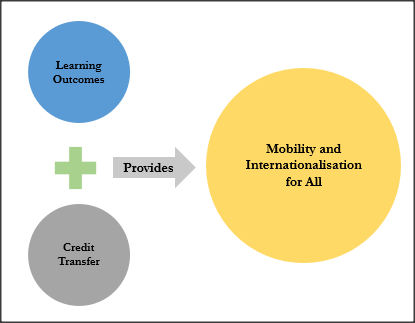Here comes the second part of the summary from the SHARE Regional Conference. The first part discusses regional harmonisation and student mobility. In this part, I will talk about “Learning Outcome.” This concept has actually been around for a few years. However, it has really taken off in recent years. Everyone has been talking about it.
Definition
Learning outcome can be defined as what student know, understand and are able to do on the completion of a learning activity. Each programme should contain around 10 – 12 learning outcomes. It is said that learning outcomes and credits form a building block for student mobility.
Mobility and Internationalisation
In other words, in the past when students who had studied abroad wanted to transfer credits of the courses to their home university, the exact or similar content would have to be matched for that to be possible. However, it is recommended nowadays that the learning outcomes should be considered instead of the content, when attempting to carry out credit transfer. That means we should be looking at what students are able to achieve whether they are comparable between the courses.

Let us not forget that one of the focuses of the SHARE Regional Conference was to increase student mobility and the level of internationalisation within ASEAN.
International/Intercultural Learning Outcome
One thing that really caught my attention during this session is one learning outcome known as “international or intercultural learning outcome.” The speaker of this session gave an example that Ghent University in Belgium made it compulsory for all programmes to have international/intercultural learning outcome. It was implemented this way so that their students would become internationally competent. This would also open door to internationalisation for all at the university. The international/intercultural learning outcome needed to be made explicit for internationalisation to be instilled in the students.
Let’s Do It
I think, this is something that can and should be replicated at our university, too. It looks implementable, albeit might take a while. Just make all our curricula have international/intercultural learning outcome will be a very good start to the internationalisation at home concept that we have been talking about at SUT.
Some Experience with Learning Outcomes
When discussing learning outcomes, one of the speakers shared his experience in recruiting international students to his programme. The programme had put an emphasis on the content of all the courses in the curriculum. It was not as successful as he had hoped. He mentioned that it did not become a success until the focus had shifted to learning outcomes.
He explained that when advertising the programme, students did not want to know the content. They did not want to know what they would be studying. What did they want to know then? They wanted to know what they would be able to do from what they learned. From that, it can be claimed that outcome based education was his answer.
How to Advertise
This means that when advertising the curriculum, we should say “once you join us, this is how we are going to train you. And this is what you will be able to do.” Again, this is what students want to know. They do not want to know what content they will be studying!
As a results, course description may need to be written in a new way. That is, along with the content, outcome based course description is what we want. In other words, we should specify things like “the ability to identify and to quantify … using the following methods …”
Learning Outcome Implementation
A workshop was held at the conference in order to gather ideas for how learning outcome based education would be successfully implemented. This can be summarised as follows:
- A student orientation provides a good chance to introduce learning outcome based education as well as teaching pedagogy that will assist in achieving the required outcomes.
- An alumni/CEO/professional teaching week can provide an opportunity for students to know first hand what skills are needed in the market.
- Internship or cooperative education with proper evaluation methods will be useful.
- It is very important that the definition of each learning outcome is clear.
- We need to also consider how learning outcomes in our programme are related to local, regional and national issues.
Well, this is it for the learning outcome part. I hope that the information is useful and some of us will really implement it in higher education.
